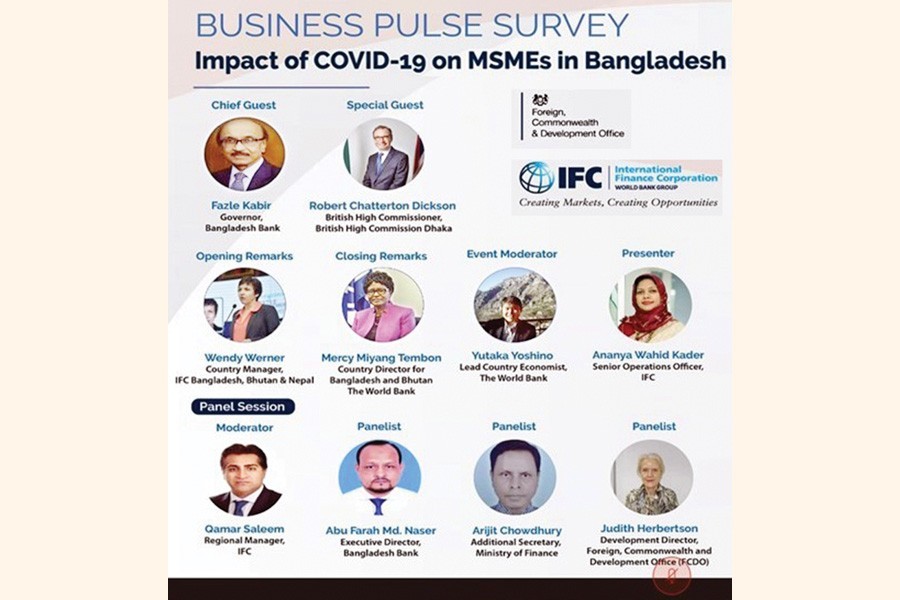Only 0.4 per cent of the country's micro, small and medium enterprises (Msmes) received financing from banks and financial institutions under the government's packages to recover from the Covid-19 pandemic-induced loss in their business.
It happened so, as the Msmes were not well informed about the bailout facilities, according to the findings of a survey report, conducted by the International Finance Corporation (IFC), revealed on Tuesday.
The survey also found that some 24 per cent of the Msmes did not receive any financing under the existing packages, and 74 per cent did not know anything about these.
However, in a separate segment, respondents in the survey said 61 per cent of the Msmes were not aware of the government support for the pandemic recovery.
About 14 per cent said they 'applied but did not receive' any support, 10 per cent said it was 'too difficult to apply' for support. Besides, five per cent was not qualified, and 10 per cent had other reasons.
The survey - 'Business Pulse Survey: Impact of Covid-19 on Msmes in Bangladesh' - was carried out in the country between June and August 2020.
The IFC and the World Bank (WB) conducted it in partnership with the UK's Foreign, Commonwealth and Development Office (FCDO).
The survey was conducted on over 500 Msmes across eight divisions in the country along with other South Asian countries and Vietnam.
The survey found that around 37 per cent of the workers in Bangladesh's Msmes either lost their jobs, temporarily or permanently. Jobs of around 70 per cent were in vulnerable position, as 94 per cent enterprises were experiencing sharp drop in sales due to the Covid-19 impact.
On the other hand, 83 per cent firms reported that they were incurring loss during the last 30 days, when the survey was conducted.
The survey report said 70 percent of the total workers of all surveyed firms were engaged in vulnerable jobs, with their businesses either temporarily closed or partially open.
Businesses had, on an average, only enough cash to cover costs for just over 100 days. Some 91 percent of Bangladesh's businesses suffered the worst decline in cash-flow, compared with similar economies, such as - Vietnam (66 percent) and Indonesia (69 percent).
Some 37 percent of women-owned firms temporarily shut down their operations, compared with 21 percent firms owned by men, the survey found.
Agriculture was the least impacted sector in terms of decline in sales, as it supplied essential goods, and was relatively less affected by the pandemic-induced lockdown.
Fashion and clothing, the worst impacted sector, also lay off the highest number of employees during the Covid-19 outbreak in comparison with other sectors, the report said.
Among the positive changes, some nine per cent of the MSME firms started using internet, social media, specialised apps or digital platforms for conducting their daily businesses. About five per cent made investments in new equipment, and 11 per cent adjusted their products or service mix.
Some 33 percent firms said they could not pay their loan instalments at all, and 43 per cent firms said they can but not regularly.
The survey also found that 21 percent firms closed down their businesses temporarily during the pandemic.
"We are working hard to bring the economy back to its normal stage," said Fazle Kabir, the Bangladesh Bank (BB) Governor, while speaking at the report-launching programme as the chief guest.
"I appreciate the IRC's efforts to generate these valuable insights into the MSME sector. We are committed to implementing the stimulus packages, and have instructed banks to provide loans to cottage, micro, small, and medium enterprises (Cosmos) at subsidised interest rates."
He also said there is no report of firms shutting down their businesses permanently, which is a positive sign.
The central bank has taken the service and manufacturing sector into consideration to help them recover from the Covid-19 impact.
The BB governor noted that media and communities have a role to play to disseminate information to the MSMEs to bridge information gap about the facilities given by the government.
"MSMEs are the key drivers of Bangladesh's economy, which account for about 25 per cent of the gross domestic product (GDP), and employs over 20 million people," said Mercy Miyang Tembon, the WB Country Director for Bangladesh and Bhutan.
"Even before the pandemic hit, these Bangladeshi businesses were already in a precarious position, as they operate on slim margins," opined Wendy Werner, the IFC Country Manager for Bangladesh, Nepal and Bhutan.
"The fact that these businesses are now in extreme distress highlights the urgent need to boost the resilience and capacity of these enterprises, so that they can ultimately preserve jobs and be on the road to recovery."
In order to recover from this crisis, the businesses identified cash transfer, access to new credit, and loans at subsidised interest rates as the top three most needed policy supports.
As a part of the Covid-19 response in Bangladesh, the IFC has supported clients and financial institutions by investing US$75 million in working capital.
Its advisory programmes have also provided technical assistance to repurpose production lines to manufacture personal protective equipment (PPE) and facilitated industry dialogues on diversification in manufacturing.
Globally, the IFC has put in place a package of measures, worth a total of $8.0 billion, to help sustain economies and protect jobs around the world.
The United Kingdom High Commissioner in Dhaka Robert Chatterton Dickson, among others, also spoke in the programme.


